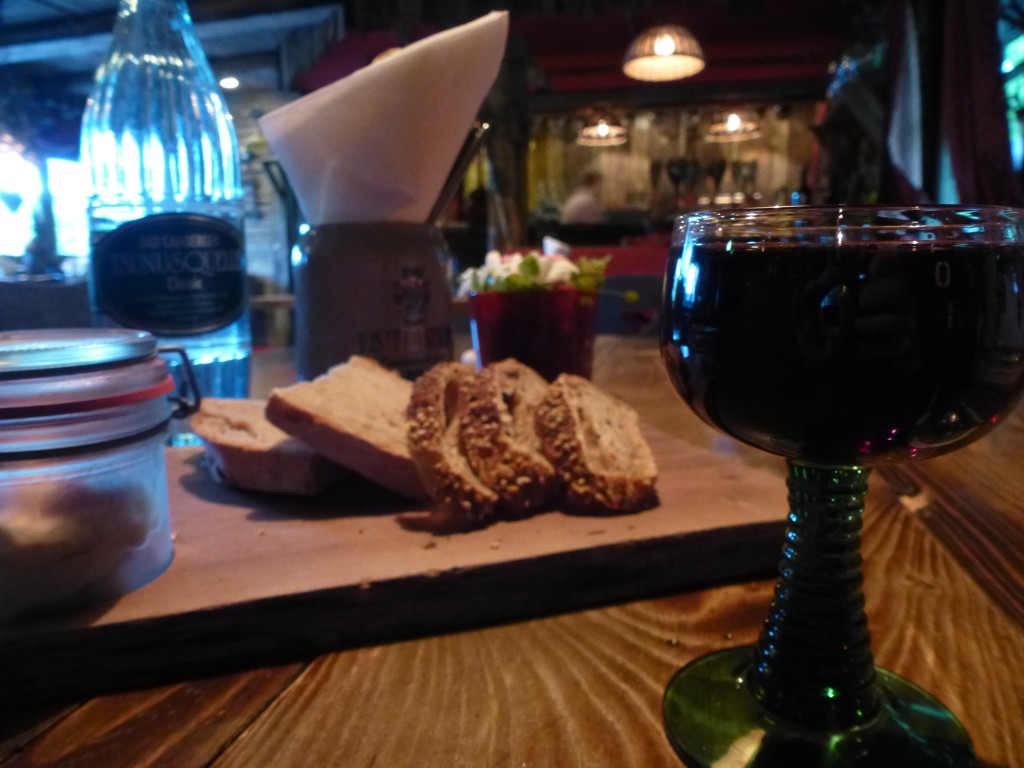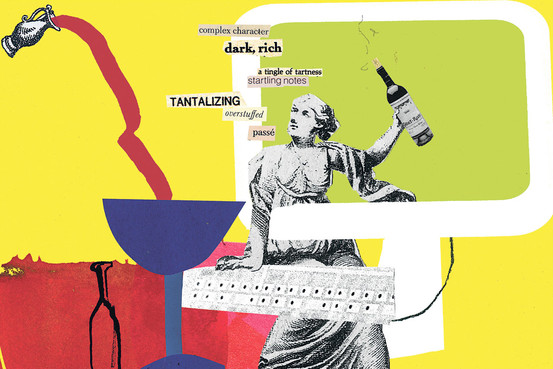Three Unusual German Reds
In addition to Spätburgunder (Pinot Noir), Germany grows a number of other red grape varieties quite successfully, as I rediscovered on a recent visit. An unusual but traditional varietal such as Lemberger was fun to drink, but what really made me want to stand up and yodel was the Merlot and the Cabernet Sauvignon/Merlot blend I tried. Wow. Who would have thought that these varieties, which reach their apex in warm, maritime Bordeaux, could do so well in cool, continental Germany?
Apparently, some smart German winemakers thought so. The World Atlas of Wine notes that there have been some “convincing experiments” with red Bordeaux varieties in Württemberg, and you can consider me convinced. Not all German reds are worth trying — many are still thin and sweet — but after tasting the Spätburgunders described in this post and the wines detailed below, I am certain that there is a German red for everyone.
2010 Staatsweingut Weinsberg Lemberger Trocken: This wine comes from Württemberg, an area just north of Stuttgart which the Atlas says is “really red wine country.” It started fruity and sweet, and I feared it would be a simple snoozer, but then a blast of black-pepper spice kicked in, ensuring that there was no way I would sleep through this glass of wine. You might have tried a Lemberger and not known it — the variety is especially popular in Austria, where it’s known as Blaufränkisch.
2007 Geisel Weinbau Brentano “R” Markelsheimer Probstberg Merlot Trocken: I had a devil of a time finding a website for this single-vineyard wine (Probstberg is the vineyard name), but I have a sneaking suspicion it’s produced by the same Geisel family which owns the hotel where I tried it, the Königshof in Munich. The restaurant’s adventurous sommelier selected this wine from northern Württemberg to pair with a main course of rabbit with artichokes, spinach and saffron, and it was startlingly delicious. I knew I was in for a treat when I gave the wine a first sniff, enjoying the aroma of ripe red fruit and earth. It had a velvety texture, rich fruit and big but firmly controlled spice. Absolutely excellent.
2010 Weingut Fritz Wassmer “Cuvée Félix” Cabernet & Merlot: This Bordeaux-style blend comes from the far southwestern corner of Baden, the southwesternmost state of Germany. I felt especially excited to try it because it comes from a town called Bad Krozingen, just a few miles from where I studied abroad in Freiburg. Again there was that velvety red fruit that I love, followed by some soft spice and a smokey finish of tobacco. It paired perfectly with an insanely large portion of Zwiebelrostbraten (roast beef with caramelized onions), and, oddly enough, it worked with the asparagus as well.







Hey, I studied in Freiburg, too! Back then, very few reds were on offer, since the area was rich with Riesling or Riesling-Silvaner blends. (I recently tried a Silvaner and it was very good.) Riesling imprinted itself on my taste for wine, and it is still my favorite. Earlier this year we traveled along the Mosel and I must have tried 25 kinds of Riesling, almost all lovely. You must try the WeinMuseum bar in Bernkastel-Kues, with over 150 selections.
I like your blog. I would like to see more about grappa. I regularly drink aguardiente bagaceira, and the German grappas are quite good. We visited a distillery along the Mosel, talked with the owner, and brought back a bottle of Tresterbrand which is sadly almost all gone. And I always get a great reaction from people in Spain when I order orujo.
Best wishes on your blog, your travels, and your wine/alcohol adventures.
Hi Lyle,
That’s so cool you studied in Freiburg! I remember those Riesling-Silvaner blends, but since I usually only spent about 5 or 6 marks on a bottle, I’m not convinced I was trying the best examples. Your trip to the Mosel sounds amazing! I did actually make it to the WeinMuseum, and I loved it. That’s my kind of museum!
I haven’t yet written a grappa post I don’t think, but I did touch on bagaceira in this post: https://oddbacchus.com/2012/01/o-licor-de-portugal/.
Thanks for your kind comment and letting me know about some of your more unusual/obscure discoveries!
Cheers,
Rob
Germany is usually associated with beer, but you would be surprised how good their wines are. There are few individuals who are producing exceptional quality of the wine.